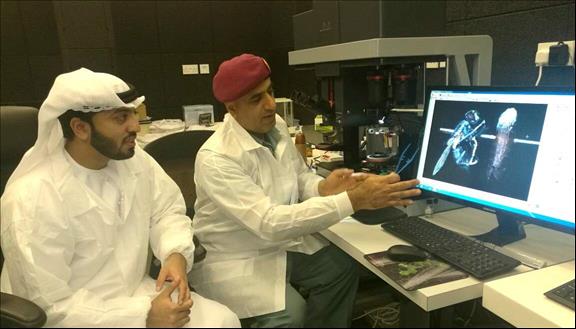
Bugs help solve crimes for Abu Dhabi police
The department of forensic evidence at the Abu Dhabi Police said the insects are widely used in solving criminal cases, by helping estimate the time and cause of death, as well as to identify the source of drug trafficking.
Captain Saeed Al Nuaimi, an expert from the department of criminal biology and criminal evidence, said the police are following the latest scientific developments to solve crime in the Capital."These modern developments contribute to solving various criminal cases, in order to enhance security, safety and justice," he added.
The police said that insects are widely found in crime scenes and by examining the contents found in the digestive system of insects, such as a maggots or larvae, forensics can estimate the time of death.Captain Al Nuaimi pointed out that modern forensics, including the use of insects in crime scenes, have allowed the forensic evidence department to solve various cases and allow the criminals to face trial, while the victims and families of the deceased receive the justice deserved.
He noted that the police will continue to work with the evolution of these methods. "The methods have succeeded in achieving record rates in detecting crimes," he added.Captain Al Nuaimi said that the Abu Dhabi Police and the Khalifa University scientists are working together to not only educate university students about modern-day science and criminology, but also to share forensic and DNA expertise, which will further help enhance and modernise the crime-solving methods in Abu Dhabi.
How the insects help police? Forensic entomology - the study of insects for medico-legal purposes - helps in discovering the estimated time of death, which is the most common need for police. The time of death can be estimated by using a successional waves of insects, which are used when individuals have been dead for longer than one month, as well as determining the age of the maggot - a method used when the discovery of the body is less than one month.
The blowflies are the quickest of all insects that discover a corpse after death. The other common types of insects include, flies, eggs, maggots, pupae or empty pupal cases, adult blow flies, as well as beetles. Once the body begins to decompose, a series of insects can by detected - microorganisms, fungi and bacteria - on the corpse.When bodies decay and dry, flies find the body less suitable. The mouth hooks of maggots are also unable to effectively operate, yet, the immature and adult formed beetles arrive even at the later stages of body's decomposition.
However, if drugs are found in the body's system, insect evidence may be affected, as chemicals play a large role with the growth.Depending on the weather conditions, the bodies can decompose slow or fast, nevertheless it goes through five main changes that attract different organisms that will feed on the body and recycle - thus allowing investigators to determine the time of death.
The basic five stages of decomposition are - fresh, putrefaction, fermentation, dry/decay and skeletonisation.

Legal Disclaimer:
MENAFN provides the
information “as is” without warranty of any kind. We do not accept
any responsibility or liability for the accuracy, content, images,
videos, licenses, completeness, legality, or reliability of the information
contained in this article. If you have any complaints or copyright
issues related to this article, kindly contact the provider above.


















Comments
No comment